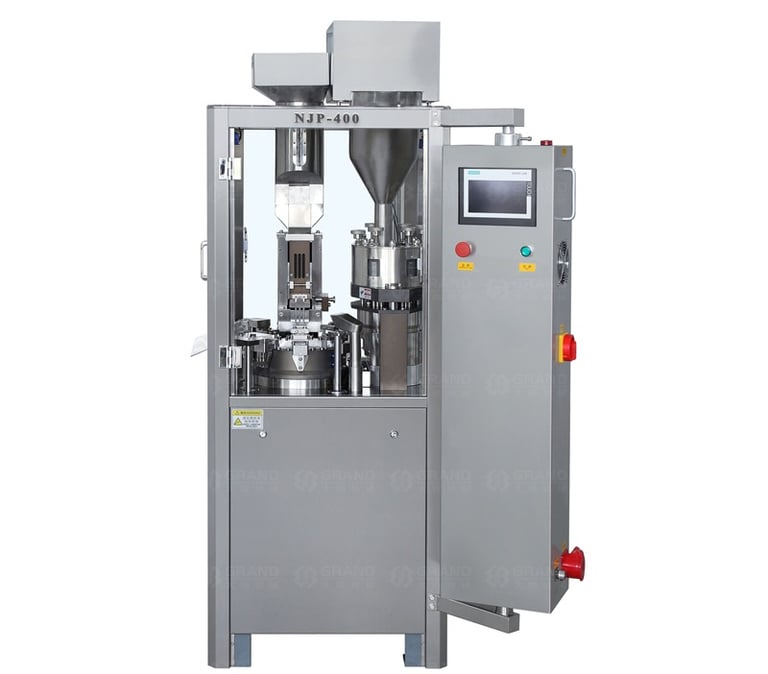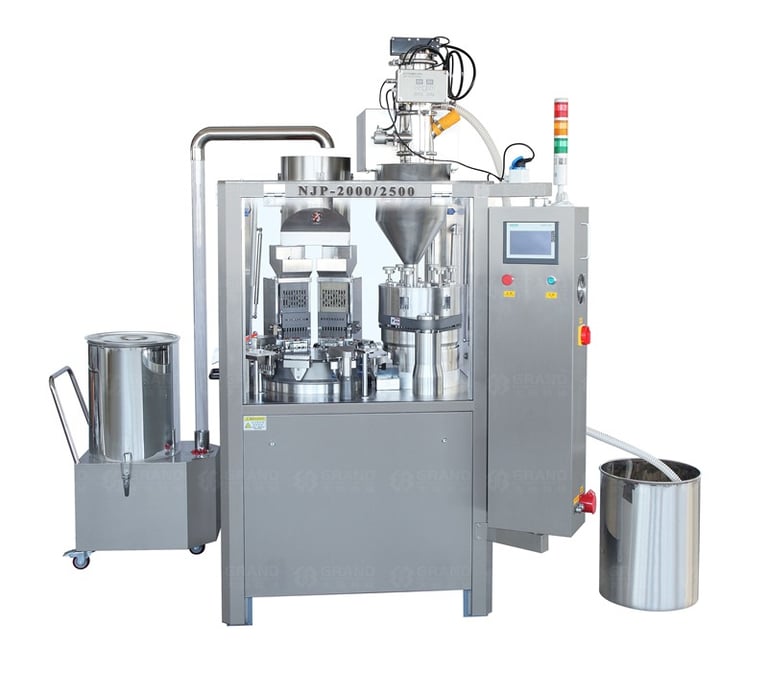From Powder to Packaged Perfection: The Complete Guide to Modern Pharmaceutical Machinery
LEON MACHINERY
8/9/20256 min read


The Critical Role of Preparation Equipment in Pharmaceutical Manufacturing
The pharmaceutical industry relies heavily on sophisticated machinery to transform raw materials into life-saving medications. Preparation equipment forms the backbone of this manufacturing process. It ensures raw ingredients are processed to exact specifications before formulation. This includes grinding raw powders to the desired particle size, granulating to improve compressibility, drying to remove moisture, and mixing to achieve homogeneity. Without meticulous preparation, the downstream packaging and delivery of medication would be compromised, potentially affecting drug efficacy and patient safety.
Each piece of preparation equipment plays a unique role. Grinding machines reduce particle size, improving dissolution and bioavailability. Granulating machines aggregate fine powders into granules for consistent tablet compression. Drying machines stabilize the material by removing moisture, critical for shelf life. Mixing machines blend active ingredients with excipients to ensure every dose is uniform. Together, they set the stage for the precise production of tablets, capsules, and liquids.
Grinding Machines – Precision in Particle Size Reduction
Particle size is a pivotal attribute in pharmaceutical manufacturing. Grinding machines perform the critical function of reducing raw material particles to the appropriate size for optimal processing and therapeutic action. Particle size impacts solubility, dissolution rate, and bioavailability of the drug product.
Pharmaceutical grinding machines range from ball mills and jet mills to hammer mills. Each type offers distinct advantages depending on material properties. For example, jet mills utilize high-velocity gas streams to achieve ultra-fine particles without contamination, making them ideal for heat-sensitive compounds. Ball mills provide efficient grinding for larger batches but may introduce heat.
The choice of grinding equipment depends on the desired particle size distribution, throughput, and product stability. Modern grinding machines incorporate features such as variable speed control, dust collection, and GMP-compliant design to ensure clean, safe, and efficient operation.
Granulating Machines – The Gateway to Tablet and Capsule Production
Granulation transforms fine powders into larger, more manageable granules, improving flowability and compressibility. This step is indispensable for the production of tablets and capsules, where uniformity and consistency are non-negotiable.
There are two main types of granulating machines: wet granulators and dry granulators. Wet granulation involves adding a binder solution to powder and then drying, while dry granulation uses compaction or roller presses without liquid addition. The choice hinges on material characteristics and product requirements.
Advanced granulating machines boast precise control over granule size, moisture content, and density. This results in better tablet hardness, reduced friability, and consistent dosage uniformity, essential for regulatory compliance and patient safety.
Drying Machines – Ensuring Stability and Shelf Life
Moisture content is a critical factor in pharmaceutical product stability. Excess moisture can lead to degradation, microbial growth, or physical changes. Drying machines remove residual solvents and moisture after granulation or other wet processes.
Common drying technologies include fluid bed dryers, rotary dryers, and vacuum dryers. Fluid bed dryers are popular for their efficient heat transfer and uniform drying, minimizing product degradation. Vacuum dryers operate at lower temperatures, suitable for heat-sensitive drugs.
Effective drying machinery maintains precise temperature and humidity control, ensuring the product meets strict moisture specifications. This step directly affects product shelf life, efficacy, and regulatory acceptance.
Mixing Machines – Achieving Uniformity in Every Batch
Uniform mixing of active pharmaceutical ingredients (API) with excipients is fundamental to dosage accuracy and therapeutic consistency. Mixing machines blend powders, granules, or liquids into homogenous mixtures.
Various types of mixers exist, such as V-blenders, ribbon mixers, and planetary mixers. Each suits specific formulations and batch sizes. V-blenders excel in gentle powder mixing without degradation, ribbon mixers handle viscous materials, and planetary mixers are versatile for multiple phases.
Modern pharmaceutical mixers offer programmable controls, variable speed, and batch documentation, facilitating process validation and quality control.
Package Equipment – Bridging Production and Patient Use
Packaging is the final critical step that ensures pharmaceutical products reach consumers safely and maintain their quality throughout shelf life. Package equipment includes various machines designed to fill, seal, count, and box medications.
Efficient packaging not only protects drugs from contamination and damage but also facilitates accurate dispensing and compliance with regulatory labeling requirements. Automation and precision in packaging reduce waste, increase throughput, and improve traceability in supply chains.
Capsule Filling Machines – Speed, Accuracy, and Compliance
Capsule filling machines automate the process of filling hard or soft capsules with powders, pellets, or liquids. These machines offer high-speed production with exact dosing accuracy, crucial for consistent therapeutic outcomes.
There are manual, semi-automatic, and fully automatic capsule fillers available, with the latter preferred for large-scale pharmaceutical manufacturing. Advanced models integrate weight control systems, rejection mechanisms for defective capsules, and compatibility with various capsule sizes and types.
Capsule filling machines must comply with strict hygiene standards, incorporating stainless steel construction and easy cleaning features to prevent cross-contamination.
Tablet Presses – The Heart of Solid Dosage Manufacturing
Tablet presses compress granules or powders into tablets of specific shape, size, and hardness. This machine is central to solid oral dosage form manufacturing.
Tablet presses vary from single-station to rotary presses capable of producing thousands of tablets per minute. Sophisticated models allow for precise control of compression force, tablet thickness, and weight, enabling consistent tablet quality.
Innovations include multi-layer tablet pressing for combination therapies and tooling for unique tablet shapes. Quality control features detect and reject tablets that do not meet specifications, ensuring safety and efficacy.
Blister Packing Machines – Protecting Products and Extending Shelf Life
Blister packing machines form individual cavities or pockets to securely hold tablets, capsules, or other solid dosage forms, sealed typically with a foil or plastic cover. This packaging protects products from moisture, oxygen, and tampering.
Modern blister packers are highly automated, featuring thermoforming, sealing, and cutting modules integrated into a continuous process. They accommodate various blister sizes and shapes, providing flexibility for different pharmaceutical products.
Blister packaging improves product visibility and patient compliance by clearly displaying dosage information, often combined with peelable or push-through foil designs.
Oral Liquid Filling and Sealing Machines – Liquid Medication with Integrity
Oral liquid filling machines accurately fill bottles or vials with syrups, suspensions, or solutions. Sealing ensures product sterility and prevents leakage.
These machines incorporate volumetric or peristaltic pumps for precise dosing. Advanced models include automatic capping and labeling systems, streamlining the packaging line.
Sterility and hygiene are paramount; therefore, equipment is designed for easy cleaning and sterilization, often compliant with cGMP standards.
Strip Packing Machines – Flexible Solutions for Pharma Products
Strip packing machines seal tablets or capsules between layers of foil or plastic film, creating a compact and protective strip. This packaging format is favored for convenience, dosage accuracy, and protection from environmental factors.
Strip packing is especially common for oral solid dosage forms, providing portability and tamper evidence.
The machines feature high-speed feeding, sealing, and cutting mechanisms, adjustable for different strip sizes and materials.
Counting and Filling Lines – Precision Meets Productivity
Counting and filling lines automate the accurate counting of tablets, capsules, or other solid forms and fill them into bottles or containers. This equipment boosts production efficiency and minimizes human error.
Advanced lines use vision systems, weight sensors, and rejection mechanisms to ensure each container holds the correct count, maintaining regulatory compliance.
Integration with capping, labeling, and packaging equipment creates streamlined end-to-end manufacturing lines.
Cartoning Machines – The Final Touch in Pharmaceutical Packaging
Cartoning machines erect boxes, fill them with product containers, and seal them for shipment. This packaging stage provides protection during transportation and an opportunity for branding and regulatory labeling.
Pharmaceutical cartoners are designed to handle delicate products, ensuring minimal damage during packing. They accommodate various carton sizes and styles, including tuck-in flaps, crash-lock bottoms, and glued cartons.
Automation features like robotic arms and vision inspection increase speed and accuracy.
Vial Filling Machines – Sterility and Accuracy in Injectable Medicines
Vial filling machines are specialized for filling sterile injectable products into glass or plastic vials. These machines maintain aseptic conditions to prevent contamination.
They incorporate precise dosing pumps, automated stopper placement, and capping systems. Many vial fillers operate within cleanroom environments, adhering to FDA and EMA sterile manufacturing guidelines.
The ability to handle small batch sizes to large volumes makes them essential for vaccine production, biologics, and parenteral drugs.
How to Choose the Right Pharmaceutical Equipment for Your Facility
Selecting the optimal machinery depends on multiple factors: product type, batch size, regulatory requirements, budget, and scalability. A thorough assessment of production goals and challenges helps determine the best equipment combination.
Partnering with experienced suppliers like Leon Machinery ensures access to advanced machines, customization options, and after-sales support, enabling smooth operations and compliance with global standards.
Future Trends in Pharma Manufacturing Technology
Pharmaceutical manufacturing is rapidly evolving with Industry 4.0 innovations. Automation, IoT connectivity, AI-driven predictive maintenance, and advanced process analytics are reshaping production.
Flexible modular lines, continuous manufacturing, and personalized medicine manufacturing are gaining momentum, requiring adaptable and intelligent machinery.
Investing in future-proof equipment enhances productivity, quality, and competitiveness.
Leon Machinery – Your Partner in Pharmaceutical Equipment Solutions
Leon Machinery offers a comprehensive portfolio of pharmaceutical preparation and packaging equipment, supported by technical expertise and global logistics. From grinding and granulating to blister packing and vial filling, Leon Machinery provides turnkey solutions tailored to your needs.
Contact us today to discuss your project:
📞 WhatsApp: +8618136773114
📧 Email: leonxu0317@gmail.com
#PharmaMachinery #TabletPress #CapsuleFillingMachine #BlisterPackingMachine #VialFillingMachine #PharmaceuticalPackaging #GranulatingMachine #DryingMachine #MixingMachine #OralLiquidFilling #PharmaProductionLine #LeonMachinery #MedicalEquipment #HealthcareManufacturing #B2BPharmaSolutions #PackagingMachinery


